Please browse the following books which are available for checkout from the IDEA Center's lending library. IDEA Clubs and their members have priority to borrow these materials. Please note that the listing of any resource does not necessarily imply any endorsement by the IDEA Center of the views expressed in that resource.
Pro-Intelligent Design |
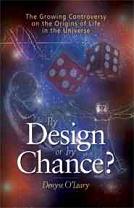 | Denyse O'Leary
Emphasis: Intelligent design
Journalist Denyse O'Leary provides a broad introduction to the debate over intelligent design. O'Leary fearlessly tackles some of the hardest questions faced by intelligent design proponents. This is one of the best lay-level introductory books to the debate over intelligent design.
Qty available: 1
|
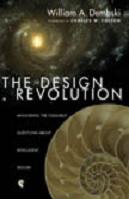 | William Dembski
Emphasis: Intelligent Design -- Responding to Objections
This great book is essentially a defense of intelligent design theory, responding to frequently asked questions or frequently raised objections. Among many topics covered, some include "sub-optimal design," "is intelligent design creationism?", and the "argument from ignorance" objection. If you have questions or objections about intelligent design, read this book first!
|
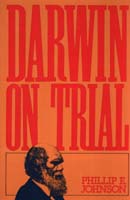 | by Phillip JohnsonEmphasis: Science and Philosophy Darwin On Trial was in a way the original, and still is the landmark book of the "Intelligent Design Movement." Though a lawyer, Johnson uses many scientific and philosophical arguments to challenge Darwinism with the type of criteria he says would be found in a courtroom. The book contains discussions of fossil evidence, natural selection, philosophy of science, and the legal setting of creation vs. evolution in the classroom. Qty available: 5 |
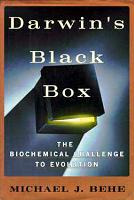 | by Michael BeheEmphasis: Science, particularly Biochemistry This book is the best place to start to understand a good part of the biochemical rationale for accepting that life was designed. Behe, a professor of biochemistry at Lehigh University, provides a well-written and easy-to-understand discussion of the unevolvability of many "irreducibly complex" features of the cell. Qty available: 1 |
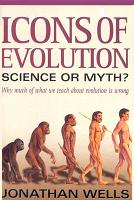 | by Jonathan WellsEmphasis: Science and Philosophy If you want to understand your biology textbook and evolution, Icons of Evolution is a great place to start. Molecular and Cell biologist Jonathan Wells discusses problems with common lines of evidence used to support evolution in textbooks. He also goes into detail about general arguments against evolutionary theory. Qty available: 2 |
 | Guillermo Gonazlez and Jay W. Richards
Emphasis: Cosmology, Physics, Astrophyics
This book discusses a new form of the "anthropic argument" for the design of the cosmos and solar system, in that it finds that not only does the universe appear designed for life, but our habitat appears to be designed for discovery .
Qty available: 1
|
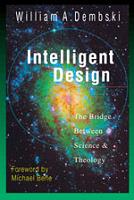 | by William DembskiEmphasis: Philosophy, Science, Theology This book deals with the philosophical and theological issues raised by the science of intelligent design theory. It is not intended as a scientific treatment, but Dembski, who holds both a Ph.D. in philosophy and a Masters in Divinity gives the issue a philosophical treatment. To an extent, it is intended towards a Christian audience, to give a Christian interpretation of the meaning of the scientific theory of intelligent design in light of Christian theology and the Bible. That intelligent design can be discussed from a Christian perspective in no way implies that intelligent design is not a scientific theory. Qty available: 1 |
 | William A. Dembski
Emphasis: Intelligent design, evolutionary algorithms, information theory
This seminal book on the methodology for detecting design argues that evolution is incapable of producing certain types of complexity, and that intelligent design is the best explanation. Chapter 5 includes a calculation of the specified complex information in the bacterial flagellum, and chapter 6 provides responses to common objections.
Qty available: 1
|
 | William A. Dembski
Emphasis: Intelligent design theory, mathematics
In seminal book by Dembski (Cambridge University Press, 1998), the grounds for inferring design are laid out. This book is laden with mathematical symbols and logic argument, but has enough prose to still get the points across.
Qty available: 1
|
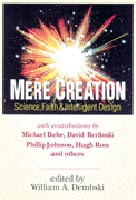 | edited by William DembskiEmphasis: Science and Philosophy This book is a collection of essays by names such as Hugh Ross, Michael Behe, Philip Johnson, and David Berlinski which discuss the meaning of intelligent design and existence of God. The book was born out of the "Mere Creation" conference at Biola University in 1996, the essays are generally technical, and range from such topics as philosophy of science to the hominid fosil record, from Big Bang cosmology to irreducible complexity. It is dicusses intelligent design theory from many angles. Qty available: 2 |
 | Lee Strobel
Emphasis: Science, Interviews of Scientists
In this book, former press reporter Lee Strobel interviews various scholars from the intelligent design movement to document their views of the evidence supporting intelligent design.
Qty available: 1
|
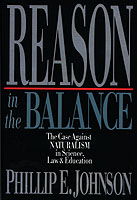 | by Phillip JohnsonEmphasis: Law, Philosophy, Society, Education This book discusses the implications and origins of naturalistic thought and philosophy in science and our culture. Through examples from law and education, Johnson illuminates how pervasive naturalistic philosophy has resulted in "viewpoint discrimination" in the classroom. Qty available: 3 |
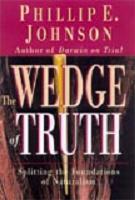 | by Phillip JohnsonEmphasis: Law, Philosophy, logic This book is somewhat similar to Reason in the Balance in that it deals with the philosophical and logical ideas guiding science. This book, however, deals more with how these principles have/are working themselves out in the real world of education, law, science, and politics. It also includes answers to philosophical objections made against "Intelligent Design Theory". Johnson also responds to critics of intelligent design and gives his view on the status of the debate. Qty available: 2 |
 | Cornelius G. Hunter
Emphasis: Religion, Science, Philosophy
Hunter addresses the religious motivations behind Darwin's theory of evolution by looking at the influences of Milton, rationalism, the enlightenment, and Deism, quoting extensively from Darwin's journals, letters, and scientific writings. Readers of history, science, philosophy, and theology will enjoy this honest telling of a complex and engrossing story.
Qty available: 1
|
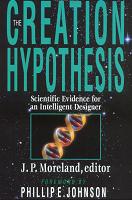 | by J. P. Moreland (Editor)
Emphasis: Science and Philosophy
This book is a collection of essays by names such as Hugh Ross, Kurt Wise, Phillip Johnson, and J. P. Moreland which discuss the existence of God. While some of these essay specifically identify that God as the God of the Bible, others simply discuss philosophical and scientific arguments for and against materialism.
Qty available: 3
|
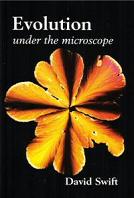 | David Swift
Emphasis: Biology, evolution, intelligent design
Biologist David Swift provides a broad critique of evolutionary theory which focuses on molecular biology and problems with evolving biological complexity at the cellular level.
Qty available: 1
|
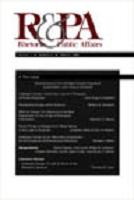 | Volume 1, Number 4, Winter 1998
Emphasis: Philosophy, some science
This short and somewhat technical journal, published by Michigan State University Press, contains a collection of essays by various authors discussing the implications of and arguments for accepting intelligent design into science. Contributing authors include John Angus Campbell (editor), William Dembski, Stephen C. Meyer, Jonathan Wells, Paul Nelson, Michael Behe, and Phillip Johnson.
Qty available: 3
|
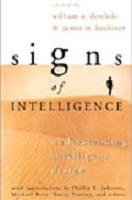 | edited by William Dembski and James Kushiner Emphasis: Science and Philosophy This book is a collection of essays by design theorists such as William Dembski, Jay Wesley Richards, Nancy Pearcy, Phillip Johnson, John Mark Reynolds, and Stephen C. Meyere, Walter Bradley, Michael Behe, and others. It includes both scientific and philosophical discussions of intelligent design. The IDEA Center uses this book in teaching our IDEA Courses because we feel it gives the most "bang for your buck." It is a short, concise, and very broad overview of many of the core issues being promoted by individuals in the intelligent design movement. Qty available: 3 |
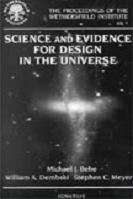 | Michael J. Behe, William A. Dembski, Stephen C. Meyer Emphasis: Biology, DNA, Information Theory, Philosophy of Science This book is published part of the Proceedings of the Wethersfield Institute based off of papers presented at a New York Conference in 1999. The authors provide revised and updated versions of their various arguments. Dembski promotes his "explanatory filter," while Meyer argues for the design of DNA. The book also provides responses to criticisms, discusses the scientific status of intelligent design, and discusses science and theology. Qty available: 2 |
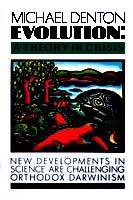 | by Michael Denton
Emphasis: Science and Philosophy
This pre-ID movement-book lays out many of the strongest arguments against evolutionary theory. Denton, a molecular biologist, discusses fossils, molecular biology, genetics, systematics, and many other topics in this critique of evolution.
Qty available: 3
|
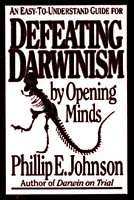 | by Phillip JohnsonEmphasis: Philosophy, logic Aimed at a high-school or college-age reader, this short, easy-to-read book gives logical principles and reasoning tools from which to analyze and understand the creation-evolution controversy. It discusses the philosophical implications of theistic evolution, and the importance of the questions over intelligent design for our culture. Qty available: 3 |
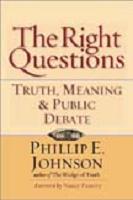 | Phillip JohnsonEmphasis: Culture, Education, Ethics This book contains many of Phillip Johnsons thoughts on major issues facing society today, from the war on terror to intelligent design. Johnson's theme is that by "asking the right questions," we can better find the solutions to problems today. The book also highlights Johnson's personal journey of faith through struggles he has faced in his own life. Qty available: 3 |
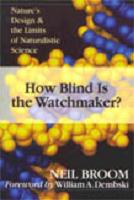 | by Neil Broom
Emphasis: Philosophy, Science, Theology
This book goes through a layman’s tour of nature’s incredible machinery such as lilliputian molecular pumps, rotary engines and corkscrew propellers, molecular monkey bars of the cell’s cytoskeleton. Broom then discusses Michael Polanyi’s concept of hierarchical structures in living systems, and also reviews origin-of-life arguments and principles of natural selection.
Qty available: 1
|
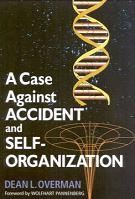 | Dean L. Overman
Emphasis: Origin of life, Chemistry
This book provides a detailed critique of the ability of natural chemical processes to create life one earth. It also discusses the evidence for cosmic design and biological design, refuting the notion that life is the result of an "accident."
Qty available: 1
|
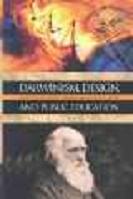 | John Angus Campbel and Stephen C. Meyer (Editors)
Emphasis: Education, Law, Paleontology, Biology, Genetics, Intelligent Design
Published in 2003, this 600 page multidisciplinary volume contains technical essays from many members of the intelligent design movement including Stephen C. Meyer, David DeWlf, Michael Keas, David Berlinski, Alvin Palntinga, Jonathan Wells, William Dembski, Paul Chien, and Michael Behe. It also includes articles by critics of intelligent design such as Michael Ruse, Massimo Pigliucci, and William Provine. The volume discusses whether or not Darwinism should be taught critically in public schools, provides a scientific critique of the treatment of evolution in biology textbooks, provides a scientific rationale for intelligent design, and has an extensive section for critics.
Qty available: 1
|
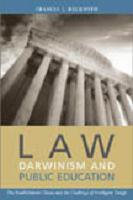 | Francis J. Beckwith
Emphasis: Law, Education
Francis Beckwith analyzes many of the legal questions surrounding the teaching of intelligent design theory in public schools. After reviewing many of the major court cases, Beckwith analyzes the state of the law in light of intelligent design theory.
Qty available: 1
|
 | Thomas Woodward
Emphasis: History
This book gives a history of the intelligent design movement, beginning with early scientific dissenters to evolution up to the year of its publication (2003). Woodward gives detailed analysis of many of the critics of intelligent design and concludes with a discussion of "paradigm shifts" in the context of the intelligent design movement.
Qty available: 1
|
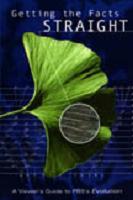 | Discovery Institute
Emphasis: Biology, Paleontology, History
This book is intended as a "Viewer's Guide to PBS's Evolution" and is comprehensive response, episode by episode, to the PBS Evolution series. It provides scientific evidence that differs with that presented in the PBS Evolution seriesand a rebuttal to many of the controversial claims made in PBS Evolution about history, paleontology, evolutionary biology, philosophy, microbiology, and religion.
Qty available: 1
|
 | Edited by Jon Buell and Virginia Hearn
Emphasis: Philosophy of Science
This book contians papers from a symposium entitled "Darwinism: Scientific Inference or Philosophical Preference?" with many papers which debate whether Darwinism is "philosophy or science."
Qty available: 1
|
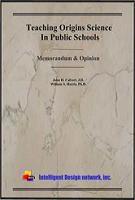 | John H. Calvert and William S. Harris Emphasis: Law, Education This booklet, freely available online at http://www.intelligentdesignnetwork.org/legalopinion.htm, provides an opinion of the legality of teaching intelligent design. Calvert, a lawyer, and Harris, a biochemist discuss the scientific evidence, and legal issues. The booklet emphasizes neutrality in origins education where naturalism is not promoted over other views of origins. Qty available: 1 |
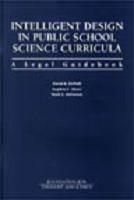 | David K. DeWolf, Stephen C. Meyer, Mark E. DeForrest Emphasis: Law, Education, Philosophy of Science Also available online, this booklet presents a legal case advocating that it is possible to teach intelligent design theory in public schools. The pamphlet focuses on philosophy of science, determining that intelligent design theory is science. Qty available: 1 |
 | Phillip Johnson
Emphasis: Law, Darwinism
This book is a collection of Phillip Johnson's finest essays appearing in magazines and journals. Johnson covers a wide range of topics including naturalism, pop science, religious freedom, postmodernism, and natural law. If you have read and appreciated Professor Johnson's other books, you'll enjoy this gathering of his finest work written for magazines and journals. It is also an excellent introduction to a thinker who has become one of the foremost cultural critics of our day.
Qty available: 1
|
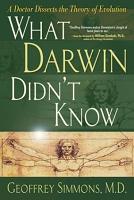 | Geoffrey Simmons, M.D.
Emphasis: Physiology, Biology
Written by a medical doctor, this book discusses aspects of the design of human and animal physiology. It contains factually informative discussions of many aspects of physiology, anatomy, and the human body. After explaining how many biological systems work, the book gives treatement to how they often are "Whole-Package Phenomena" where all the parts must be present for them to function properly. The book's forward is by William Dembski.
Qty available: 1
|
 | Jos Verhulst
Emphasis: Comparitive Embryology, Orthogenesis
Jos Verhulst provides an impressive array of data from comparative embryology to argue that the origin of humans is the result of a non-materialistic force driving evolution towards a pinnacule humanlike form. His basic thesis is that by delaying development, the intelligent human species emerged.
Qty available: 1
|
Pro-Creationism |
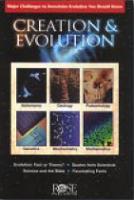 | Rose-Publishing
Emphasis: Astronomy, Geology, Paleontology, Genetics, Biochemistry, Mathematics
This short pamphlet provides a concise summary of the major arguments against evolution from various scientific disciplines. It also deals with the chemical origins of life. The pamphlet also argues in favor of young earth creationism through geological and cosmological arguments.
Qty available: 1
|
 | Hugh Ross
Emphasis: Cosmology, Anthropic Principles
Hugh Ross, (PhD Astronomy, University of Toronto) discusses scientific evidences for design in the universe and the philosophical implications and motivations behind various cosmological models proposed by astrophysicists in the 20th century. He also discusses the case for an old-earth and universe from a Biblical perspective.
Qty available: 2
|
 | by Jack Cuozzo
Emphasis: Neanderthal
Proposes an alternative theory to the origin of Neanderthals. Cuozzo, an orthodontist, is well-versed in the growth and development of the human skull, particularly the mouth area. Cuozzo demonstrates his case that Neanderthal skull-morphologies could be the result of humans whose growth patterns were set to yield ages on the order of 200-400 years, as the Bible says they once lived.
Qty available: 1
|
 | Hugh Ross
Emphasis: Mathematics, Astronomy, Philosophy, Religion, Theology
In this scientific and devotional book, Hugh Ross explains how phenomena that seem impossible in the four-dimensional world become comprehensible when examined in the context of extra-dimensional reality. He presents what science has learned about extra dimensions and relates these findings to difficult doctrines—the Incarnation, the Atonement, the Trinity, free will and predestination, the new creation, hell, and other issues—that have perplexed believers and unbelievers for centuries.
Qty available: 1
|
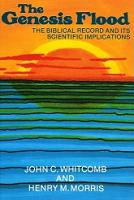 | John C. Whitcomb, Henry M. Moris
Emphasis: Biblical Scripture, Geology
This landmark 1961 book launched the creation-science movement with its arguments that the Bible and geology supported that the entire earth was deluged in the Flood of Noah about 5000 years ago. The book provides many forms of geological arguments in favor of the flood.
Qty available: 1
|
 | Hugh Ross
Emphasis: Biblical Scripture, Astronomy, Old Earth Creationism
Founder of Reasons to Believe, Hugh Ross presents an apologetics commentary on Genesis. With careful integration of the scientific and theological data, Dr. Ross explains in the updated edition how the ongoing research into the origin and development of the universe, Earth, plant life, animal life, humans, and human civilization matches the Hebrew texts, supporting an old earth creationist perspective. The book describes the highlights of each creation day and demonstrates the consistency of the Genesis 1 and 2 creation accounts.
Qty available: 1
|
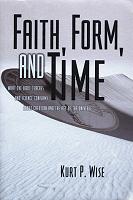 | Kurt P. Wise
Emphasis: Paleontology, Geology, Biology, Theology, Explanation of Biblical Scripture
This book by Kurt P. Wise, who obtained his Ph.D. in paleontology studying under Stephen Jay Gould, provides an informed and critical view of evolutionary theory from the standpoint of a young earth creationist paleontologist. The book covers a Biblical view on the origins issue, making a case for harmony between a young earth creationist model and the Biblical text, It focuses on the events of the creation week through the Flood of Noah, and the Tower of Babel. all the way to redemption of the world in Revelation. It introduces many scientific concepts, teaching about biological classification, genetics, geology and paleontology. The book spends considerable time discussing the Flood of Noah in the context of catastrophic plate tectonics.
Qty available: 1
|
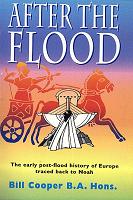 | by Bill Cooper
Emphasis: Genesis Flood,
Anthropology, History, Geneology
Cooper, a layman, has done hours of research in libraries to uncover documentation that the royal houses of some European countries trace their ancestry back to a Noah-like figure. Using very complex arguments which get into the history of various European peoples and rules of textual analysis, Cooper makes an interesting and educational case that many pre-Christian European tribes actually believe they were descended from the Biblical Noah.
Qty available: 1
|
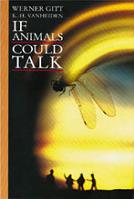 | Werner Gitt, K. H. Vanheiden
Emphasis: Biology, Zoology
This book provides evidence for design of animals based upon their macrophysiological characteristics. Design evidences include many interesting facts from biology.
Qty available: 1
|
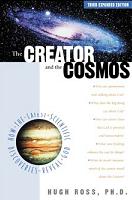 | by Hugh Ross
Emphasis: Anthropic Principles
Hugh Ross, (PhD Astronomy, University of Toronto) discusses scientific evidences for design in the universe. He also discusses the philosophical and religious implications of his arguments.
Qty available: 1
|
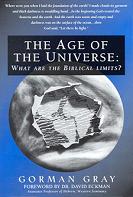 | Gorman Gray
Emphasis: Theology, Scripture, Cosmology, Geology
Gorman Gray takes the position a literal interpretation does not necessarily require belief in a young universe. Gray allows for the posibility that the earth and universe are old, but life is young. Gray makes his arguments with care and attention to Biblical Scripture. This unique perspective is worth a read.
Qty available: 1
|
 | Paul Ackerman and Bob Williams
Emphasis: Law, Education
This book contains a firsthand account, from a creationist perspective, of the legal battle over education and evolution in Kansas state science standards in the Kansas State Board of Educatiomn in 1999.
Qty available: 1
|
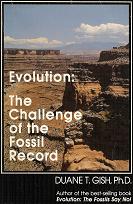 | Duane Gish
Emphasis: Paleontology, Evolution
This book is an update of Gish's early book, "Evolution: The Fossils Say No!" Gish critiques many of the stories of evolution through looking at the fossil record, claiming that the fossil record lacks transitional forms. Gish looks at various transitions in evolution from microorganisms to fish, fish to amphibians, amphibians to reptiles, and reptiles to mammals. He then looks at the origin of humans, concluding the fossil record supports creation over evolution.
Qty available: 1
|
 | Marvin L. Lubenow
Emphasis: Paleoanthropology, Human Evolution
In tihs book, Marvin L. Lubenow discusses in detail many the theories of human evolution, looking at many hominid fossils from a creationist perspective. The book is detailed and looks at the claims of human evolution from many angles.
Qty available: 1
|
 | Jonathan Sarfati Emphasis: Biology, Paleontology, Education This compact book provides an excellent summary of many of the major arguments against evolution, and the book is intended as a response to Teaching About Evolution and the Nature of Science by the National Academy of Sciences. It provides in depth discussions of the issues raised in the NAS booklet, with a major focus on transitional forms and missing links. The book is written from a pro-young earth creationist viewpoint. An online study guide is also available. Qty available: 1 |
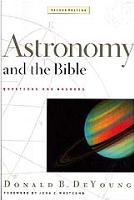 | by Donald B. DeYoung
Emphasis: Astronomy
Geared towards a young-earth-creationist position, Donald DeYoung (PhD. in Physics from Iowa State University, M-Div from Grace Seminary) discusses in this book many aspects of astronomy ranging from interesting but trivial facts to core aspects of the young-earth creationist argument.
Qty available: 1
|
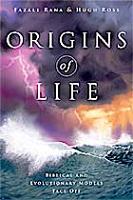 | Hugh Ross and Fazale Rana
Emphasis: Chemistry, biology, the Book of Genesis, origin of life
Old earth creationists Hugh Ross and Fazale Rana provide a critique of the hypothesis that life had a natural chemical origin on earth, and argue that their Biblically based model for the origin of life is superior.
Qty available: 1
|
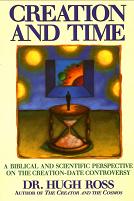 | Hugh Ross
Emphasis: Astronomy, Biblical Scripture, Geology, Earth History
The nontechnical and informal is intended to be a persuasive account of how Biblical Scripture makes the most sense in light of a correct understanding of Scripture and the scientific evidence when understood from an old earth creationist viewpoint. The book seeks to persuade the reader that Dr. Rosss progressive-creation, day-age beliefs can completely reconcile science and Scripture.
Qty available: 1
|
| by Ralph O. Muncaster
Emphasis: Science, History
Discusses various scientific truths found in the Scripture of the Bible from fields such as medicine, geology, biology, physics, astronomy, agriculture, engineering and chemistry.
Qty available: 1
|
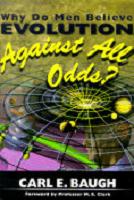 | Carl E. Baugh
Emphasis: Origin of Life, Evolutionary History, Paleontology, Physics
This book discusses the "odds" that evolution could have taken place. The book contains many color illustrations and sections to support a young age of the earth. It also has exensive discussions of the "Paluxy River Tracks."
Qty available: 1
|
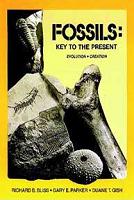 | Richard B. Bliss, Gary E. Parker, Duane T. Gish
Emphasis: Paleontology
This book for kids encourages critical thinking and introduces the concept of the fossil and discusses living and extinct forms of life through the fossil record. It discusses various evolutionary models of the fossil record and the lack of transitional forms.
Qty available: 1
|
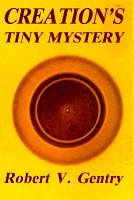 | Robert V. Gentry
Emphasis: Geology
This book by geologist Robert Gentry proposes the idea that polonium halos in granite rock imply that they had a very recent origin. Gentry discusses responses to his work, both in the science community and in the courtroom in trials over the teaching of evolution. The book advocates a young earth creationist viewpoint.
Qty available: 1
|
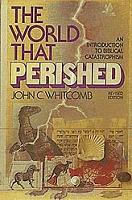 | John C. Whitcomb Jr.
Emphasis: Theology, Scripture, Geology
This 1973 book theologian John C. Whitcomb presents his Scriptural case for the young age of the earth and the flood, and discusses many lines of geological evidence supporting a young origin of geological features.
Qty available: 1
|
| Henry M. Morris
Emphasis: Scripture, Biblical History, Science
This book argues that evolution causes many evils in society, and also discusses a Biblical view of young earth creationism. It also discusses various scientific objections, such as radiometric dating or the time it would take for starlight to reach the earth.
Qty available: 1
|
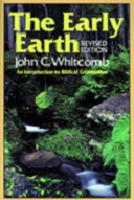 | John C. Whitcomb, Jr.
Emphasis: Astronomy, Geology, Scripture, Biology
This 1972 book provides a comprehensive defense of the young earth creationist viewpoint from the perspectives of astronomy, geology, Biblical scripture, and biology.
Qty available: 1
|
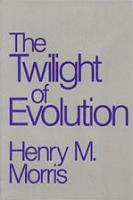 | Henry M. Morris
Emphasis: Biology, Sociology, Theology, Geology, Scripture
This 1963 book describes many biological arguments against evolution, and looks at the evils that Morris cites evolution as having caused in culture. He gives a theological and scriptural argument for young earth creationism, and supports his views with evidence from geology. The book also contains some early arguments against systematics and the creation of phylogenetic trees.
Qty available: 1
|
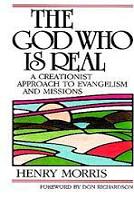 | Henry Morris
Emphasis: Scripture, Science, Religion
This book discusses how evidence from creation shows that there is a God and that the Creator is the God of the Bible and not a god of pantheism. Morris outlines his understanding of God's purposes in using creationism to bring people to Christ.
Qty available: 1
|
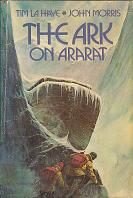 | Tim La Haye and John Morris
Emphasis: Geology, Anthropology
This book describes various expeditions in the early 1970's to try to find Noah's Ark on the top of Mount Ararat.
Qty available: 1
|
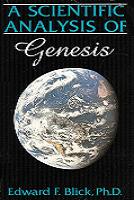 | Edward F. Blick
Emphasis: Astronomy, Geology, Anthropology
This book discusses many lines of evidence used to support young earth creationism, paying particular attention to changes in the earth since the flood. It also discusses "flood stories" in human cultures about the flood. It also critiques the origin of life.
Qty available: 1
|
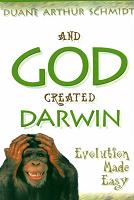 | Duane Schmidt
Emphasis: Macroevolution, Biology
This book critiques evolutionary theory in a fairly non-technical format. It critiques it from the origins of life through macroevolution of life, particularly the origin of mammals. It also provides a basic discussion of the arguments for intelligent design. The book critiques mainstream methods of dating and seems to advocate young earth creationism.
Qty available: 1
|
| Duane Arthur Schmidt
Emphasis: Education, Biology
In this short illustrated book, Duane Schmidt, DDS, gives various arguments against evolution. The book is aimed at parents and gives a very basic approach to the issues.
Qty available: 1
|
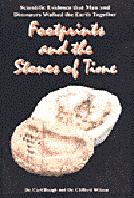 | Carl Baugh and Clifford Wilson
Emphasis: Paleontology, Anthropology
This book discusses the Paluxy River tracks where it is claimed that dinosaurs and humans left footprints in the same Cretaceous strata. This book thus agues for the young earth creationist position in that humans and dinosaurs coexisted.
Qty available: 1
|
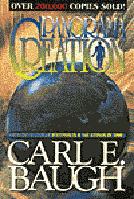 | Carl E. Baugh
Emphasis: Biology, Ecology, Psychology
Tihs book discusses some of Carl Baugh's research on the canopy theory, where he claims that a canopy of frozen water encircled the earth, causing increased atmospheric pressures before the flood. He discusses his ideas of many of the degradational changes in both humanity and in the earth since the Flood of Noah.
Qty available: 1
|
Pro-Intelligent Design |
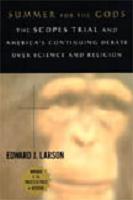 | Edward J. Larson
Emphasis: History, Law
In this Pulitzer Prize winning book, law professor and historian Edward Larson looks at the events leading up to and taking place during the Scopes Trial. The book gives a neutral historical account of the legal battles and public perception of the creation - evolution controversy in America. Note: Please note that this book is listed as pro-intelligent design because of a current defect with our website which is being fixed. In reality this book is neutral, and we are working on making that a category for this book. We apologize but appreciate your understanding.
Qty available: 1
|
Pro-Evolution |
 | Edited by William A. Dembski and Michael Ruse
Emphasis: Intelligent design, evolution, biology, information theory
This neutral volume gives many viewpoints about origins the chance to state their case. It is a wonderful example of how constructive dialogue can occur over the origins issue, and a testimony to the fact that ID proponents are interested in dialogue, cooperative inquiry, and sharing the microphone in the debate over origins. Although this volume is fairly balanced and there are many articles by ID proponents, the majority of contributors are not ID proponents so we list it here in the "pro-evolution" section.
Qty available: 1
|
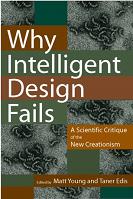 | Edited by Matt Young and Taner Edis
Emphasis: Intelligent design, biology, Darwinian evolution
This book provides a number of scientific criticisms of intelligent design theory, put forth by scientists from various discplines. It explores topics such as the evolution of the bacterial flagellum, the explanatory filter, cosmic design, and the evolution of irreducible complexity.
Qty available: 1
|
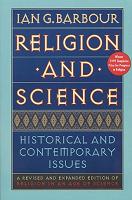 | Ian G. Barbour
Emphasis: Philosophy
Winner of a Templeton Prize in science and religion, this book by well known scientist and scholar Ian G. Barbour describes the history of the relationship between science and religion, and the history of evolutionary thought. Various models of science and religion are discussed, including the psychology of how people deal with these issues. It takes an explicitly anti-creationist position.
|
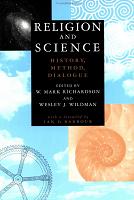 | W. Mark RIchardson and Wesley J. Wildman (editors)
Emphasis: Philosophy, History
This collection of essays by various philosophers discuss the relationship between science and religion. Most take a pro-evolution viewpoint, and feel that religion should generally be subservient to science. Noteworthy contributors include Nancey Murphy, John Polkinghorne, and Arthur Peacocke.
Qty available: 1
|
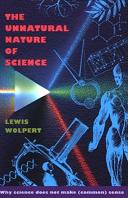 | Lewis Wolpert
Emphasis: Philosophy and history of science
Lewis Wolpert provides his account of the nature of science, and argues that it sometimes defies common sense, but yet has a strong logical basis.
Qty available: 1
|
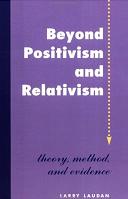 | Larry Laudan
Emphasis: Philosophy of science
Philosopher of science Larry Laudand deconstructs many notions about the nature of science, including the idea that science can be defined through various "demarcation criteria."
Qty available: 1
|
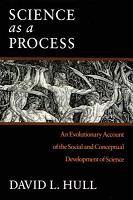 | David Hull
Emphasis: Philosophy of Science
David Hull describes the nature of science by looking particularly at the history of biology and evolutionary theory.
Qty available: 1
|
| Holmes Rolston, III
Emphasis: Philosophy. Religion
This interdisciplinary book by philosopher Holmes Rolston looks at the relationship of science and religion in the fields of biology, psychology, sociology, and physics. Rolston is not overly friendly to theistic evolutionism, though he does advocate a religious view that life is generated in the presence of death, a natural selection-isk concept. Rolston also discusses the relationship of eastern religions to science.
Qty available: 1
|
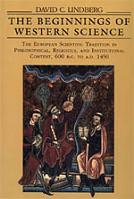 | David C. Lindberg
Emphasis: History
This comprehensive illustrated volume covers the origins of science in the west from the Greeks 600 B.C. through the Roman period and Middle Ages all the way to the Rennaissance in the 1400's. Lindberg is Hilldale Professor of the History of Science at the University of Wisconsin, Madison.
Qty available: 1
|
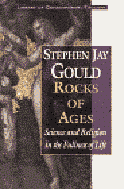 | Stephen Jay Gould
Emphasis: The relationship of science and religion
In this short book, Stephen Jay Gould develops his "Non-overlapping Magisteria" model of science and religion. Gould's essential claim is that science and religion cannot conflict, because they talk about different things.
Qty available: 1
|
 | Brian J. Alters and Sandra M. Alters
Emphasis: Science, Education
This book is meant to be like a teachers manual for teaching evolution to students who are skeptical of evolution, for either religious or scientific reasons. Much of the book is written in a Q & A format.
Qty available: 1
|
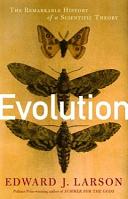 | Edward J. Larson
Emphasis: Evolutionary biology, history
Historian and legal scholar Edward J. Larson provides an account of the origin of Darwin's theory, with many anecdote's from Darwin's life, and many insights into Darwin's mind. Larson then traces the evolution of evolutionary theory into the 20th century, tracking scientific developments, legal battles, and shifts in social perceptions.
Qty available: 1
|
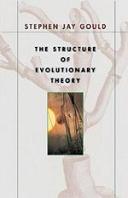 | Stephen Jay Gould
Emphasis: Science
This massive book is Gould's magnum opus on evolution, completed not long before his sad death in 2003. It concerns his views on how evolutionary theory works.
Qty available: 1
|
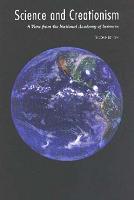 | Francisco Ayala (Chair) and others (see the online author list) Emphasis: Creationism, Religion, Biology, Paleontology This book criticizes creationism and intelligent design theory on scientific and philosophical grounds. It is an updated version of the 1984 statement by the NAS which discussed only creation science. The book discusses topics such as the origin of life, origin of biological complexity, transitional forms, and geological time from a pro-evolution viewpoint. Though the book pictured at left is the 2nd edition, we also have the 1st edition (first published in 1984) available for loan. Qty available: 1 |
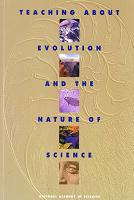 | Donald Kennedy (Chairman) and others (see the Title Page for more authors) Emphasis: Education, Evolutionary Biology This 140 page booklet is designed as a teacher's guide for teaching evolution, written by the National Academy of Sciences from a strongly pro-evolution viewpoint. The authors do not recommend teaching any evidence that contradicts evolution or supports intelligent design, but give various teaching exercises, methods, and lines of evidence through which to teach only the evidence that supports evolution. Qty available: 1 |
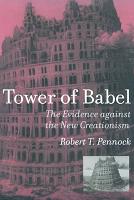 | Robert T. Pennock Emphasis: Philosophy, Evolutionary Biology, Linguistic Evolution Philosopher Robert T. Pennock gives a comprehensive critique of intelligent design theory, first from the standpoint of philosophy, and then from biology. Pennock attempts to demystify creationism by classifying it in evolutionary biology's terms. Pennock criticizes creationism for its "divisions" and various viewpoints, giving much attention to the young earth viewpoint, and then proceeds to psychoanalyze intelligent design proponents, and critiques their arguments. A critical review of this book can be found here. Qty available: 1 |
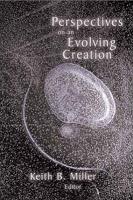 | Edited by Keith B. Miller
Emphasis: Science and Religion
This book contains a collection of essays by various theistic evolutionists discussing their views about how evolution fits with Christianity.
Qty available: 1
|
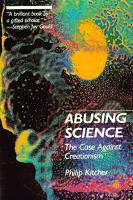 | Philip Kitcher
Emphasis: Science, Philosophy
This book, written in 1982, is written by philosopher of science Philip Kitcher. Kitcher argues primarily against the young eath position both from scientific and philosophical standpoints.
Qty available: 1
|
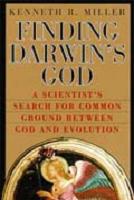 | Kenneth R. Miller
Emphasis: Biology, Philosophy, Theology
Roman Catholic and Brown University biologist Kenneth Miller gives his take on the origins issue in this book which takes a strong pro-evolution stance. Miller spends most of the book making a case for evolution by critiquing young earth creationism, intelligent design, irreducible complexity, and advocates the plausibility of evolution, even under punctuated equilibrium. He also tries to give a portrait of how evolution could work under Christian theism, with a God who apparently works undetectable behind the scenes.
Qty available: 1
|
 | Ernst Mayr
Emphasis: Evolutionary biology
This magnum opus by the late evolutionary biologist Ernst Mayr, both explains many aspects of evolutionary biology in clear terms and also makes Mayr's strongest case for the validity of evolutionary theory.
Qty available: 1
|
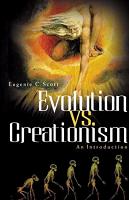 | Eugenie C. Scott
Emphasis: The Nature of Science and Religion
This book discusses the nature of science and religion, and gives arguments why intelligent design is creationism and not science. It also surveys the legal status of teaching evolution, creationism, and intelligent design.
Qty available: 1
|
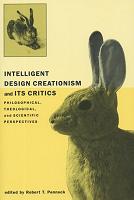 | Robert T. Pennock (editor)
Emphasis: Philosophy, Biology, Mathematics, Theology
Intelligent design critic Robert T. Pennock edits an 805 page volume of over 20 authors, most of whom critique intelligent design, apparently naming it "creationism" in the title. Critical authors include Barbara Forrest, Howard J. Van Till, Philip Kitcher, Michael Ruse, Elliot Sober, Nancey Murphy, Richard Dawins, Stephen Jay Gould, Robert T. Pennock, and many others. Pro-intelligent design authors include Phillip Johnson, Michael Behe, William Dembski, Paul Nelson, and Alvin Palntinga. As might be guessed from the rabbit on the cover, one of Pennock's main complaints is that ID is little more than glorified magic. Other articles deal with many aspects of the debate over intelligent design.
|
 | Mark Perakh
Emphasis: Intelligent design (criticisms of), evolution
In this book, physicist Mark Perakh gives a variety of objections to intelligent design ranging from skepticism about the mechanism of design to objections to the methods by which design is detected. Perakh also discusses some creationists and their interpretations of Genesis.
Qty available: 1
|
 | Lynn Margulis and Dorion Sagan
Emphasis: Evolutionary biology, genomics
Influential evolutionary biologist Lynn Margulis and Dorion Sagan give their account of evolution which de-emphasizes the importance of natural selection and uplifts the notion that symbiosis, or "acquiring the genomes" of microorganisms has directed much of macroevolution.
Qty available: 1
|
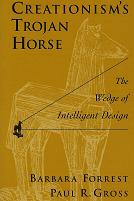 | Barbara Carroll Forrest, Paul R. Gross Emphasis: Politics, Philosophy This book critiques the intelligent design, or as it callsit, "Wedge movment" by discussing its religious and political motivations. They see intelligent design theory as a threat to the separation of church and state. Also, see our Corrections and Comments to statements made about the IDEA Center in Creationism's Trojan Horse page. Qty available: 1 |
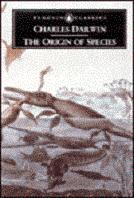 | Charles Darwin Emphasis: Evolutionary Biology This is the book through which Charles Darwin introduced his theory of evolution in 1859. It is a must-read for anyone interested in the history of evolutionary theory. Darwin makes his case that all organisms arose through a struggle for survival where natural selection caused them to evolve over long periods of time. If you have web access, there is no need to borrow this book as it can be read online here. Qty available: 1 |
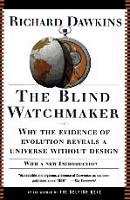 | Richard Dawkins
Emphasis: Evolution
This classic book by British zoologist Richard Dawkins gives his explanation of how biological complexity can be built up in slow, gradual steps through natural selection. A treatise on gradualism, this book provides numerous examples of how Dawkins thinks complexity can be built up.
Qty available: 1
|
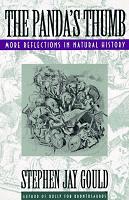 | Stephen Jay Gould
Emphasis: Natural History, biology, evolution, dysteleology
This classic book by Gould makes the argument that there is evidence of a lack of design in living biological organisms and throughout the history of life.
Qty available: 1
|
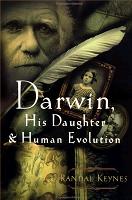 | Randal Keynes
Emphasis: Biography, History of Evolutionary Biology, Philosophy
This biography of Darwin discusses how his relationship with his daughter influenced his views on human evolution. It discusses Darwin's dysteleological views and how his bewilderment that God would permit evil and suffering in the natural world, and after his daughter's deaith, his own life, influenced his views about evolution and natural history.
Qty available: 1
|
 | Douglas J. Futuyma
Emphasis: Evolutionary Biology
Evolutionary Biology is a popular college level textbook on evolution. It discusses the history of evolution, genetic basis for evolution, population genetics, the fossil record, punctuated equilibrium, and even has a section answering creationist objections to evolution.
Qty available: 1
|
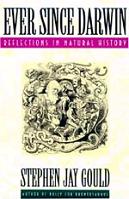 | Stephen Jay Gould
Emphasis: Natural history, philosphy, history of science
Another classic by Gould, in this book he puts forth his view of the meaning evolution has for the place of humanity while telling a variety of interesting tales from the history of science.
Qty available: 1
|
| Niles Eldredge and Ian Tattersall
Emphasis: Paleontology, human origins, evolutionary biology
In this book, well known paleontologists Niles Eldredge and Ian Tattersall provide their views on human origins.
Qty available: 1
|
| Alfred S. Romer
Emphasis: Paleontology, Vertebrate Evolution
This classic 1959 treatise on vertebrate evolution discusses the fossil record of vetebrates from an evolutionist perspective.
Qty available: 1
|
| George Gaylord Simpson
Emphasis: Evolution, Philosophy, history of life
Simpson, an influential biologist in the 20th century, wrote this book in 1949 to discuss the meaning evolution has for man's place in nature. He outlines the history of life according to evolution, and also discusses his view of humanity's future evolution.
Qty available: 1
|
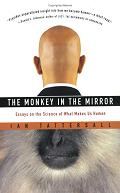 | Ian Tattersall
Emphasis: Paleoanthropology, Human Evolution
This book is a collection of essays by famous paleoanthropologist Ian Tattersall on human origins. He is somewhat critical of evolutionary psychology, and also takes aim at a gradualistic view of human origins.
Qty available: 1
|
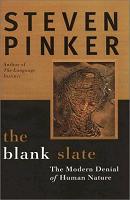 | Stephen Pinker
Emphasis: Evolutionary Psychology, Sociobiology, Philosophy
Harvard psychologist Stephen Pinker makes his case that all human behavioral traits are heritable (i.e. connected to genes), that the effect of being raised in the same family is smaller than the effect of genes (i.e. nurture less important than nature), that humans are ultimately the product of natural selection. In Pinker's view, to whatever extent "nature" controls our behavior, to that same extent our behavior has been shaped by evolutionary proceses. Thus he writes:
"Evolution is central to the understanding of life, including human life. Like all living things, we are outcomes of natural selection; we got here because we inherited traits that allowed our ancestors to survive, find mates, and reproduce. This momentous fact explains our deepest strivings..." (pg. 52)
"The selected genes will therefore be the 'selfish ones', in Richard Dawkins's metaphor--more accurately, the megalomaniacal ones, those that make th most copies of themselves. An adaptation is anything brought about by the genes that helps them fulfill this metaphorical obsession, whether or not it fulfills human aspirations. And this is a striklingy different conception from our everyday intuitions about what our faculties were designed for." (pg. 53)
In summary, Pinker believes that "our faculties" "were designed" "for" the purposeof survival and reproduction, etc. It seems that he does believe that natural selection played the primary role in the origin of our behavior and Pinker looks at the implications of his views for ethics, child rearing, and other aspects of human society.
Qty available: 1
|
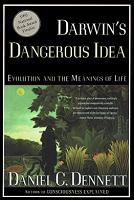 | Daniel C. Dennett
Emphasis: Philosophy, evolutionary biology, behavioral evolution
Philosopher and scientist Daniel Dennett gives his fiercely materialistic account of the origin of biological complexity and also human behavior. He also provides his take on the creation - evolution issue.
Qty available: 1
|
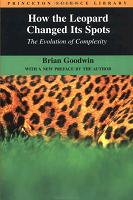 | Brian Goodwin
Emphasis: Biological Evolution, Information, Complexity
Goodwin argues that natural selection alone cannot account for the origin of species, or biological complexity. He sees complex relationships between members of an individual species and sees that some aspects of complexity may be properties which emerge from chaos. He has a variety of criticisms of neo-Darwinism, although he provides alternative evolutionary explanations.
Qty available: 1
|
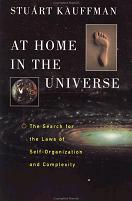 | Stuart Kauffman
Emphasis: Self-Organization, Evolution, Cosmic Evolution
Kauffman develops his principles of self-organization in this book aimed at a more popular level. Self-organization is a competing theory to natural selection and intelligent design to explain the origin of biological complexity. Like natural selection, it is a materialistic theory of the origin of biological complexity. However, in this book, Kauffman expresses some of the same skepticism of the creative power of natural selection that is found in the writings of some ID proponents.
Qty available: 1
|
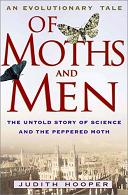 | Judith Hooper
Emphasis: Evolution
Judith Hooper retells the famous story of the "peppered moth" from a skeptical perspective. Hooper is not a professional scientist, but a journalist who looks at the motivations and lives of those who perpetuated the story that the peppered moth was proof for natural selection. She looks at that story with a skeptical eye and also raises broader questions about dogmatism in science.
Qty available: 1
|
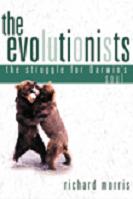 | Richard Morris
Emphasis: Evolutionary Biology, History of Biology
This fascinating book highlights some of the major questions in evolutionary biology today, such as debates over the rate of evolution, methods of speciation, evolutionary psychology, and the role of natural selection. The book is written from a strongly pro-evolution viewpoint where "Evolution Is a Fact" but highlights some of the questions facing evolutionary biologists.
Qty available: 1
|
 | Simon Conway Morris
Emphasis: Paleontology, evolutionary biology, philosophy of biology
Paleontologist Simon Conway Morris gives his account of why there is much "convergence" among life on earth and how this challenges the notion that the diversification of life on earth has had a generally stochastic and undetermined history.
Qty available: 1
|
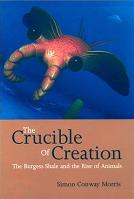 | Simon Conway Morris
Emphasis: Paleontology, evolution
Paleontologist Simon Conway Morris gives his detailed description of the Cambrian fauna, filled with historical anecdotes and photographs.
Qty available: 1
|
 | Stephen R. Palumbi
Emphasis: Evolutionary biology
This book looks at how evolution takes place as a result of humans using technology to combat disease. It also provides an introduction to evolutionary theory
Qty available: 1
|
 | Robert Pollack
Emphasis: Biochemistry, genetics
Robert Pollack describes the workings of the genetic code and how it helps create organisms through its coded "language."
Qty available: 1
|
